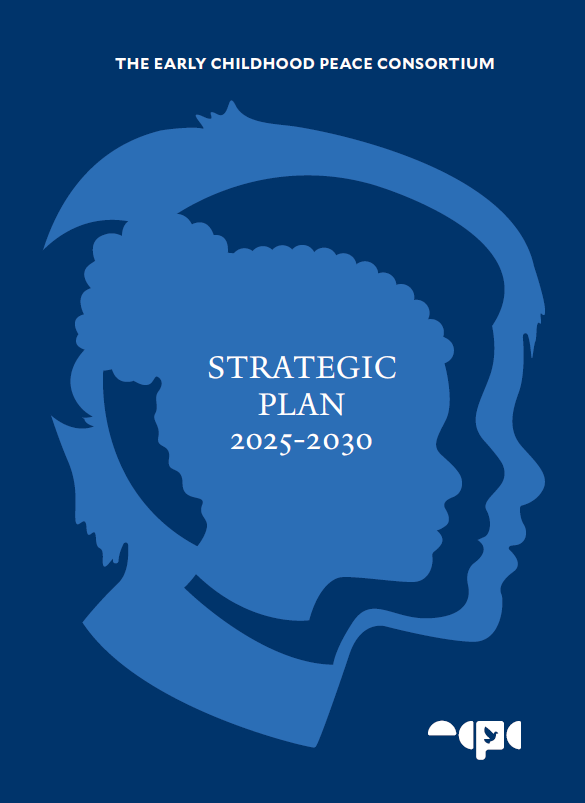
NEW YORK, September 25, 2025 — The Early Childhood Peace Consortium (ECPC) today launched its Strategic Plan 2025-2030 at its high-level session during the 80th United Nations General Assembly, offering a evidence-based roadmap for how early childhood development (ECD) programs can protect and heal children caught in active conflicts while breaking intergenerational cycles of violence.
Dr. Siobhan Fitzpatrick, ECPC Regional Vice-Chairperson and Chairperson of the International Network on Peace Building with Young Children, presented the Strategic Plan at the event, “Stop War on Children NOW! Why Science Says Protecting Children’s Rights Today Prevents Tomorrow’s Conflict,” hosted by the Permanent Mission of Ireland to the United Nations.
“With 1 in 5 children globally living in active conflict zones and violations against children surging 25% in 2024, the time for action is now,” said Dr. Rima Salah, Chairperson of the ECPC. “This Strategic Plan provides a roadmap for how evidence-based early childhood development programs can reach children suffering in war zones today while building the foundation for lasting peace tomorrow.”
The Strategic Plan draws on decades of evidence from conflict-affected regions—including Northern Ireland, Lebanon, Rwanda, Colombia, and Palestine—demonstrating that trauma-informed parenting programs and nurturing care interventions can reduce violence, support caregivers, and strengthen community resilience even amid ongoing conflict.
Addressing Today’s Crisis While Building Tomorrow’s Peace
The plan emphasizes that early childhood development programs are not merely preventive—they are lifesaving interventions for children experiencing trauma, displacement, and family separation right now. Evidence shows these programs can buffer the devastating effects of war on young children’s development while supporting the mothers, fathers, and caregivers who are themselves under extreme stress.
“For over 25 years, we’ve seen how investing in early childhood development builds pathways from divided communities to lasting peace,” Dr. Fitzpatrick said. “Now we’re bringing these proven approaches to scale globally, ensuring that children trapped in war zones today receive the support they need while we work to prevent tomorrow’s conflicts.”
Key Strategic Objectives Include:
- Research: Embedding ECD and trauma-informed parenting programs into global sustainable development knowledge systems
- Practice: Institutionalizing ECD as lifesaving core services across education, health, peacebuilding, and child protection systems in conflict-affected contexts
- Advocacy: Securing inclusion of ECD in the post-2030 global development agenda and humanitarian response frameworks
- Policy: Mobilizing champions within multilateral institutions and civil society to prioritize early childhood in peacebuilding strategies
The Strategic Plan calls for early childhood development programs to be prioritized as lifesaving interventions that must continue throughout humanitarian responses—not as secondary concerns to be addressed only after conflicts end.
The event featured groundbreaking scientific evidence showing how violence leaves epigenetic marks across generations, as well as demonstrations of how holistic ECD programs operating in war zones from Lebanon to South Sudan are currently supporting families and building resilience in the midst of crisis.
Dr. Najat Maalla M’jid, UN Special Representative on Violence Against Children and Acting Special Representative for Children and Armed Conflict, delivered the keynote address, emphasizing that protecting children’s rights in conflict is both a moral imperative and a practical strategy for sustainable peace.
The ECPC is a global consortium of UN agencies, NGOs, researchers, practitioners, and the private sector committed to sharing evidence on how investment in early childhood development contributes to sustainable peace. Launched at UNICEF in 2013, the consortium has grown to include partners from Yale University, UNICEF, the Mother Child Education Foundation (AÇEV), and numerous research institutions and implementation organizations worldwide.
For more information:
- ECPC Strategic Plan 2025-2030
- ECPC UNGA80 High-level Session, “Stop War on Children NOW!”
- Website: ecdpeace.org
Media Contact: Early Childhood Peace Consortium Email: secretariat@ecdpeace.org

